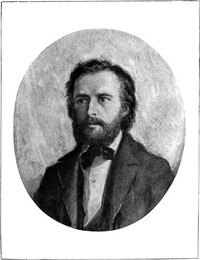The Riddle of the Universe at the close of the nineteenth century by Ernst Haeckel
"The Riddle of the Universe at the Close of the Nineteenth Century" by Ernst Haeckel is a scientific publication written in the late 19th century. This work explores the intricate relationship between biology, philosophy, and the cosmos, presenting a comprehensive inquiry into the prevailing doubts and mysteries of existence as perceived in Haeckel's time. The book emphasizes the importance of empirical investigation and proposes a monistic philosophy that seeks to unify nature,
science, and human understanding. The opening of the book unfolds with Haeckel's assertion of a significant transformation in knowledge and thought by the end of the 19th century. He portrays a duality in progress: while science has advanced tremendously, especially in revealing the workings of the universe and biological processes, societal, moral, and spiritual realms seem stagnant or regressive. Haeckel introduces the "world-riddles," a series of great enigmas regarding existence that challenge humanity’s understanding, and he outlines his philosophical stance that combines scientific observations with a monistic interpretation of nature. The reader is invited to contemplate elements like evolution, the nature of life, and humanity’s place within the broader context of the cosmos, framing the quest for answers as both a scientific and existential pursuit. (This is an automatically generated summary.)
Read or download for free
| How to read | Url | Size | |||
|---|---|---|---|---|---|
| Read now! | https://www.gutenberg.org/ebooks/42968.html.images | 796 kB | |||
| EPUB3 (E-readers incl. Send-to-Kindle) | https://www.gutenberg.org/ebooks/42968.epub3.images | 353 kB | |||
| EPUB (older E-readers) | https://www.gutenberg.org/ebooks/42968.epub.images | 361 kB | |||
| EPUB (no images, older E-readers) | https://www.gutenberg.org/ebooks/42968.epub.noimages | 351 kB | |||
| Kindle | https://www.gutenberg.org/ebooks/42968.kf8.images | 594 kB | |||
| older Kindles | https://www.gutenberg.org/ebooks/42968.kindle.images | 520 kB | |||
| Plain Text UTF-8 | https://www.gutenberg.org/ebooks/42968.txt.utf-8 | 699 kB | |||
| Download HTML (zip) | https://www.gutenberg.org/cache/epub/42968/pg42968-h.zip | 327 kB | |||
| There may be more files related to this item. | |||||
Similar Books
About this eBook
| Author | Haeckel, Ernst, 1834-1919 |
|---|---|
| Translator | McCabe, Joseph, 1867-1955 |
| Uniform Title | Die Welträthsel. English |
| Title | The Riddle of the Universe at the close of the nineteenth century |
| Credits |
Produced by Charlene Taylor, Paul Clark, Marilynda Fraser-Cunliffe and the Online Distributed Proofreading Team at www.pgdp.net |
| Reading Level | Reading ease score: 41.7 (College-level). Difficult to read. |
| Language | English |
| LoC Class | B: Philosophy, Psychology, Religion |
| Subject | Soul |
| Subject | Religion and science |
| Subject | Evolution |
| Subject | Monism |
| Category | Text |
| EBook-No. | 42968 |
| Release Date | Jun 17, 2013 |
| Most Recently Updated | Oct 23, 2024 |
| Copyright Status | Public domain in the USA. |
| Downloads | 897 downloads in the last 30 days. |
| Project Gutenberg eBooks are always free! | |

